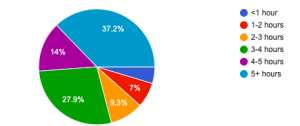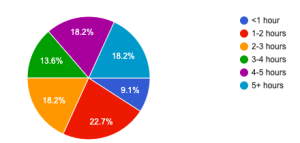Phone Addiction in Teens: Is It as Bad as Adults Think?
January 10, 2023
Humans have become boring.
25 years ago, cell phones were used to call people, stay in touch, and would maybe have a game or two. People had much better communication skills without cell phones and could do almost anything to stay entertained, such as “Kick the Can,” which is a game that is played exactly how it sounds.
However, the cell phone has massively evolved into what we consider it today. Today, the cell phone has a whole new meaning. Users can not only reach people, but can also entertain themselves, as the device enables access to social media, work, and television, and some smartphones can take pictures better than a professional camera. The cell phone has changed the way people interact with technology. As a result of cell phones, humans have become addicted. But who? Why?
 According to a survey sent out to St. Luke’s students, 37.2% of students average over five hours on their phone per day. Also, 46.5% of students pick up their phones and open them over 100 times daily. This might not seem like much, so let’s break it down.
According to a survey sent out to St. Luke’s students, 37.2% of students average over five hours on their phone per day. Also, 46.5% of students pick up their phones and open them over 100 times daily. This might not seem like much, so let’s break it down.
There are 24 hours a day. On average, a student most likely gets 7-8 hours of sleep a night. Students are at school from 9 AM to 3 PM, totaling six hours. This leaves 10 hours of free time, half or more of which is spent using a piece of metal sandwiched between two pieces of glass.
 On the other hand, adults are much more conservative with their phone use. According to a survey sent out to St. Luke’s staff, 18.2% of staff spend over 5 hours a day on their phones, almost half the time students spend on their phones. 22.7% of teachers pick up their phones and open them over 100 times daily, less than half of the student total.
On the other hand, adults are much more conservative with their phone use. According to a survey sent out to St. Luke’s staff, 18.2% of staff spend over 5 hours a day on their phones, almost half the time students spend on their phones. 22.7% of teachers pick up their phones and open them over 100 times daily, less than half of the student total.
One thing that was interesting about the teacher survey was how spread out the results were compared to the student survey. Most likely, this is due to the difference in age between teachers. Teachers range from their twenties to seventies, and different generations use their cell phones differently.
As a member of Gen-Z, sometimes I value my phone over my sleep. My phone is a vital part of my lifestyle, and I almost cannot live without it.
As shown in the data, teens use their phones much more significantly than adults. The main question is, are teens addicted to their phones? According to Oxford Dictionary, the definition of “addicted” is: “physically and mentally dependent on a particular [object], and unable to stop [using] it without incurring adverse effects.”
Speaking from personal experience, I am only dependent on my phone for vital things, such as calling or texting for essential reasons. Only sometimes do I feel completely dependent on my phone when I am bored and need something to do to occupy myself.
BNI Treatment Center, a mental health treatment facility, says, “There is ample research showing how smartphone overuse, especially social media, impacts the brain. In fact, it can cause the same brain chemical responses as a drug. When a teen sees new likes, positive comments, or new followers on their feeds, they receive a burst of dopamine. Similar to a drug’s high, as social app use escalates, the more engagement they crave.”
Social media is one of the biggest contributors to cell phone addiction. While it has many positives, including staying connected with friends, quick entertainment, and more, it has many downsides as well. The social media algorithms are specifically designed to make it challenging to leave the app, making it super easy to keep scrolling mindlessly. With no reason to stop, you can be scrolling through social media for hours without realizing it.
Teens use their phones for many different reasons as opposed to adults. The question of being addicted is more of a personal question, as the results are quite spread. If you were to lock your phone away, and you could only make emergency calls or texts, would you survive, or die of boredom? As a challenge for the new year, try to lock your phone away for an hour. See the effects, what you do, where your mind wanders. Then remember, there was no cell phone like this 25 years ago.



